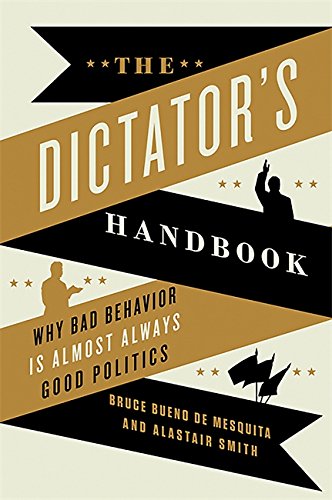The Dictator’s Handbook: Summary and Review

The Dictator’s Handbook: Why Bad Behavior is Almost Always Good Politics by Bruce Bueno de Mesquita

Review
This book completely changed my perspective on politics. Explanations of why politicians make the moves that they do in the news as based on rational self-interest has an internal logic which makes more sense to me than the analyses presented by pundits, because there is a theoretical framework I can apply on top of those decisions.
CGP Grey’s The Rules for Rulers is a good summary and is where I first heard of this book.
Notes
Who exactly you vote for is less important than the fact that you vote at all, and is far less important than what you say in a poll, and what you report in your demographic information. This is because the demographic info and polling data you provide is what actually drives decision makers to enact policies that help your voting bloc.
I’ve changed my mind on Puerto Rico: Puerto Ricans will be better off if they paid more in federal taxes, in exchange for representation as a voting bloc (assuming other problems are fixed such as the electoral college creating swing states), because it increases their visibility and power as part of the essential selectorate (but only if they push the margin in that direction—again, they would not have this power if they are not a swing state).
Protest is honest signalling of what the people want: People are granted free speech and free assembly because elected represents who want to stay in power must deliver what the people want, which means they need an effective means of listening to the people and understanding what they want. Since people want lots of different things (and a lot of those things contradict each other), democratic leaders force the people to prioritize amongst themselves to try to decide what to prioritize (if they prioritize the wrong thing, they will be voted out). The most effective way to do this is to see who is protesting, since protesting is a costly form of free speech (compared to writing angry comments online), and is therefore an honest signal of what people want.
There is no ideology, only self interest. People who claim to make decisions based on ideology are actually doing it out of self interest.
For example: Given a popular revolt / revolution in a country, either of the following can be offered as justification:
- “We support them, because of democracy / freedom!”
- “We oppose them, because there should be stability!”
This is reflected by the fact that “foreign aid” is simply a bribe to foreign governments to induce policy changes in their country to get them to do what we want. This is why the U.S. overthrows foreign democracies and installs dictatorships—better to have a foreign dictator aligned with your interests than a foreign democracy contrary to your interests.
